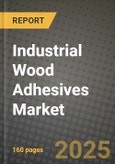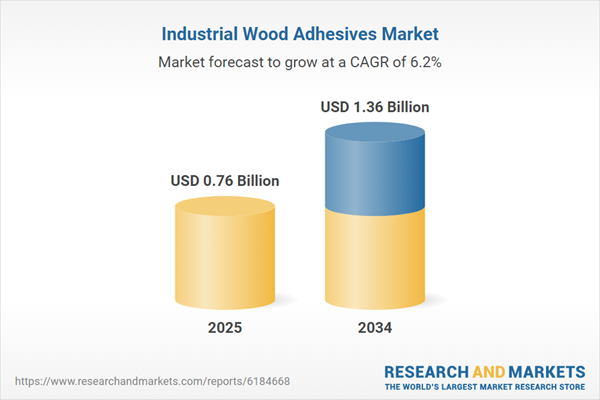Industrial Wood Adhesives Market
The Industrial Wood Adhesives Market spans urea-formaldehyde (UF), melamine-urea-formaldehyde (MUF), phenol-resorcinol-formaldehyde (PRF/PRF), polyvinyl acetate (PVA), polyurethane (PU), emulsion polymer isocyanate (EPI), hot-melt (EVA/PO), pressure-sensitive, and emerging bio-based systems used across panels (plywood, particleboard, MDF), engineered wood products (LVL, LSL, OSB, CLT, glulam), furniture & cabinetry, flooring, doors/windows, and millwork. Growth is propelled by urban construction, renovation, and the structural rise of mass timber, alongside OEM demands for faster press cycles, lower VOCs, and robust wet/heat performance. Formulators differentiate on cure speed at reduced temperatures, moisture/boil resistance, creep control, and compatibility with high-throughput lines (continuous presses, RF/microwave, short-cycle hot presses). Regulatory pressure on formaldehyde emissions (low-E0/NAF/ULEF) and worker exposure shifts portfolios toward EPI/PU and tuned UF/MUF resins with scavengers and ultra-low free monomer content, while PRF remains the benchmark for exterior, structural bonds. Sustainability pushes bio-based phenolics, lignin/tannin-modified resins, soy/carb-based crosslinkers, and mass-balance approaches without sacrificing bondline durability. Supply dynamics center on methanol-formaldehyde chains, MDI availability, and latex capacity; producers hedge via regional plants and tolling. Winning strategies pair chemistry with process know-how - moisture conditioning, spread rates, pH/temperature windows - and in-line QA (viscosity/gel, IR, grab tests). As CLT/glulam codes expand, adhesives must pass delamination/cyclic tests and fire/char interface requirements, while furniture lines demand clean machining, low blade gum, and light-color bondlines for premium finishes.Industrial Wood Adhesives Market Key Insights
- Performance by application, not resin name: Panel lines seek fast cure and low cost (UF/MUF with scavengers), while structural wood demands PRF/EPI/PU for wet strength, heat resistance, and cyclic delamination compliance.
- Mass timber is the structural growth engine: CLT and glulam expansion requires adhesives meeting long-open-time handling, thick bondline wetting, elevated-temp durability, and fire testing; certification and factory audits decide vendor lists.
- EPI and PU gain in doors, windows, flooring: Cold-curing, moisture-tolerant systems cut press energy, bond dense/hydrophobic species, and perform across seasonal humidity swings; isocyanate handling and squeeze-out control are key.
- Formaldehyde rules reshape UF/MUF: ULEF/NAF targets push scavengers, lower F:U ratios, and alternative crosslinkers; plants balance emissions with cure speed to maintain throughput.
- Process control beats lab numbers: Moisture content, pH, spread uniformity, and wood temperature dominate bond outcomes; inline gel-time checks and press recipe libraries reduce scrap and delamination claims.
- Bio-based is moving from pilot to spec’d: Lignin/tannin-modified phenolics and soy-based crosslinkers win where they meet boil/creep tests and cost-in-use; mass-balance and EPDs help in green procurement.
- RF and microwave pressing unlock speed: Cure-on-demand in thick sections shortens cycles for LVL/glulam; adhesives need dielectric response tuning to avoid hotspots and foaming.
- Substrate diversity demands primers: Oily/hard tropicals, acetylated/thermally modified wood, and overlays (HPL, foils) require primers or tailored pH catalysts to ensure wetting and long-term adhesion.
- Machining and aesthetics matter in furniture: Low-bleed, light bondlines, and minimal gum on tools reduce rework; hot-melt/EVA/PO remain staples for edgebanding with cleaner trims at high speed.
- Supply assurance > spot pricing: Dual-source monomers (formaldehyde, MDI), regional blending, and change-control documentation protect panel lines from downtime and re-qualification costs.
Industrial Wood Adhesives Market Reginal Analysis
North America
Mass timber projects (CLT/glulam) and R&R demand drive structural and interior applications. Tight emissions expectations and ASC/industrial throughput favor ULEF/NAF panels, EPI/PU for millwork, and PRF in exterior laminations. Plants value vendor tech teams that optimize press recipes across seasonal wood moisture. Procurement emphasizes supply resilience and clear change-control.Europe
Stringent emissions and sustainability norms elevate bio-lean UF/MUF, EPI, and certified PRF, with rapid growth in CLT/glulam under expanding design codes. Documentation (EPDs, VOC, worker exposure) and audited QA are decisive. Furniture and flooring OEMs prioritize light bondlines, clean machining, and recyclability narratives; energy costs push lower-temperature cures.Asia-Pacific
Largest panel production base supports scale across UF/MUF for panels and rising EPI/PU for doors/flooring. Urban housing and exports boost furniture lines needing consistent bondlines at high speed. Japan/Australia accelerate mass timber adoption, demanding certified structural adhesives and RF-capable systems. Localized resin plants and quick service are competitive levers.Middle East & Africa
Hospitality, retail fit-outs, and emerging mass-timber pilots fuel demand for heat-resistant, low-odor systems suitable for hot, arid climates. Import reliance puts a premium on shelf-stable, easy-to-handle packages and vendor training. Moisture swings between conditioned interiors and exterior transport drive preference for PU/EPI in doors and millwork.South & Central America
Growing furniture exports and regional construction support UF/MUF for panels and PU/EPI for doors/windows in humid climates. Mills seek robust adhesives tolerant of variable species and moisture. Serviceable formulations, local tech support, and financing/consignment for resin deliveries influence adoption; sustainability credentials gain weight in export tenders.Key Market players
Henkel, H.B. Fuller, 3M, Sika, Arkema (Bostik), Dow, Franklin International (Titebond), Jowat SE, Kleiberit (KLEBCHEMIE), Huntsman, Dynea, Hexion, Georgia-Pacific Chemicals, Arclin, SoudalIndustrial Wood Adhesives Market Analytics
The report employs rigorous tools, including Porter’s Five Forces, value chain mapping, and scenario-based modelling, to assess supply-demand dynamics. Cross-sector influences from parent, derived, and substitute markets are evaluated to identify risks and opportunities. Trade and pricing analytics provide an up-to-date view of international flows, including leading exporters, importers, and regional price trends.Macroeconomic indicators, policy frameworks such as carbon pricing and energy security strategies, and evolving consumer behaviour are considered in forecasting scenarios. Recent deal flows, partnerships, and technology innovations are incorporated to assess their impact on future market performance.
Industrial Wood Adhesives Market Competitive Intelligence
The competitive landscape is mapped through proprietary frameworks, profiling leading companies with details on business models, product portfolios, financial performance, and strategic initiatives. Key developments such as mergers & acquisitions, technology collaborations, investment inflows, and regional expansions are analyzed for their competitive impact. The report also identifies emerging players and innovative startups contributing to market disruption.Regional insights highlight the most promising investment destinations, regulatory landscapes, and evolving partnerships across energy and industrial corridors.
Countries Covered
- North America - Industrial Wood Adhesives market data and outlook to 2034
- United States
- Canada
- Mexico
- Europe - Industrial Wood Adhesives market data and outlook to 2034
- Germany
- United Kingdom
- France
- Italy
- Spain
- BeNeLux
- Russia
- Sweden
- Asia-Pacific - Industrial Wood Adhesives market data and outlook to 2034
- China
- Japan
- India
- South Korea
- Australia
- Indonesia
- Malaysia
- Vietnam
- Middle East and Africa - Industrial Wood Adhesives market data and outlook to 2034
- Saudi Arabia
- South Africa
- Iran
- UAE
- Egypt
- South and Central America - Industrial Wood Adhesives market data and outlook to 2034
- Brazil
- Argentina
- Chile
- Peru
Research Methodology
This study combines primary inputs from industry experts across the Industrial Wood Adhesives value chain with secondary data from associations, government publications, trade databases, and company disclosures. Proprietary modeling techniques, including data triangulation, statistical correlation, and scenario planning, are applied to deliver reliable market sizing and forecasting.Key Questions Addressed
- What is the current and forecast market size of the Industrial Wood Adhesives industry at global, regional, and country levels?
- Which types, applications, and technologies present the highest growth potential?
- How are supply chains adapting to geopolitical and economic shocks?
- What role do policy frameworks, trade flows, and sustainability targets play in shaping demand?
- Who are the leading players, and how are their strategies evolving in the face of global uncertainty?
- Which regional “hotspots” and customer segments will outpace the market, and what go-to-market and partnership models best support entry and expansion?
- Where are the most investable opportunities - across technology roadmaps, sustainability-linked innovation, and M&A - and what is the best segment to invest over the next 3-5 years?
Your Key Takeaways from the Industrial Wood Adhesives Market Report
- Global Industrial Wood Adhesives market size and growth projections (CAGR), 2024-2034
- Impact of Russia-Ukraine, Israel-Palestine, and Hamas conflicts on Industrial Wood Adhesives trade, costs, and supply chains
- Industrial Wood Adhesives market size, share, and outlook across 5 regions and 27 countries, 2023-2034
- Industrial Wood Adhesives market size, CAGR, and market share of key products, applications, and end-user verticals, 2023-2034
- Short- and long-term Industrial Wood Adhesives market trends, drivers, restraints, and opportunities
- Porter’s Five Forces analysis, technological developments, and Industrial Wood Adhesives supply chain analysis
- Industrial Wood Adhesives trade analysis, Industrial Wood Adhesives market price analysis, and Industrial Wood Adhesives supply/demand dynamics
- Profiles of 5 leading companies - overview, key strategies, financials, and products
- Latest Industrial Wood Adhesives market news and developments
Additional Support
With the purchase of this report, you will receive:- An updated PDF report and an MS Excel data workbook containing all market tables and figures for easy analysis.
- 7-day post-sale analyst support for clarifications and in-scope supplementary data, ensuring the deliverable aligns precisely with your requirements.
- Complimentary report update to incorporate the latest available data and the impact of recent market developments.
This product will be delivered within 1-3 business days.
Table of Contents
Companies Mentioned
- Henkel
- H.B. Fuller
- 3M
- Sika
- Arkema (Bostik)
- Dow
- Franklin International (Titebond)
- Jowat SE
- Kleiberit (KLEBCHEMIE)
- Huntsman
- Dynea
- Hexion
- Georgia-Pacific Chemicals
- Arclin
- Soudal
Table Information
| Report Attribute | Details |
|---|---|
| No. of Pages | 160 |
| Published | November 2025 |
| Forecast Period | 2025 - 2034 |
| Estimated Market Value ( USD | $ 0.76 Billion |
| Forecasted Market Value ( USD | $ 1.36 Billion |
| Compound Annual Growth Rate | 6.2% |
| Regions Covered | Global |
| No. of Companies Mentioned | 15 |









